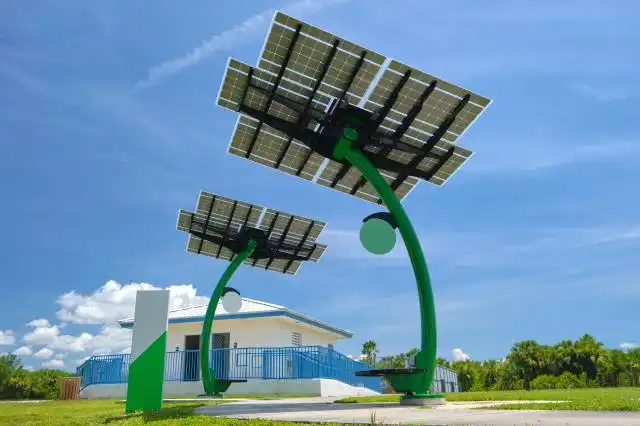Start a Solar Farm Business
Turning Sunny Days into Brilliant Business Opportunities
| Updated


SOLAR FARM BUSINESS
Imagine making money while basking under the sun - that's the allure of starting a Solar Farm Business! This green-powered venture harnesses the mighty power of the sun and converts it into electricity using solar panels. For new entrepreneurs, going into sustainable energy not only bolsters your coffers but also booms your green credentials! It's a bright day indeed when you can charge up your bank account while helping power the planet.
Jump to Business Plan
RELATED BUSINESS IDEAS
Browse ALL Sustainability & Eco-Friendly Initiatives Business Ideas
Discover Your Perfect Domain
Unlock the door to your online success with our hand-picked selection of premium domain names. Whether you're starting a new venture or rebranding an existing one, the right domain can set the tone for your digital presence. Browse through our curated list, each with its unique potential to enhance your brand's visibility and credibility.
SOLAR FARM MINI BUSINESS PLAN
This a quick reality check to help you identify the strengths and weaknesses of your business concept before you dive in.
Solar Farm Business Quick Facts:
Expected Percent Margin:
- Gross Margin: 70-80%
- Net Profit Margin: 20-30%
Earnings Expectations:
Daily Earnings: Solar farms earn via long term contracts, so daily earnings vary based on contract amount, capacity of your farm and weather conditions. Fluctuations in solar generation based on seasons need to be considered.
Weekly Earnings: These also depend on contractual agreements, local policies and solar capacity.
Monthly Earnings: Generally, a 1 MW farm might earn $40,000 to $60,000 per month.
Annual Earnings: An average 1MW solar farm can generate between $500,000 to $800,000 annually.
Actions to Hit Those Numbers:
Site Selection & Procurement:
- Locate a plot with a high level of solar irradiance and easy access to the grid.
Legal & Permitting:
- Familiarise yourself with local permitting and utility interconnection requirements.
Farm Installation:
- Partner with an experienced solar project EPC or construction firm.
Contracts & Financing:
- Utilise Power Purchase Agreements (PPAs) to secure long-term contracts for energy sales.
Operation & Maintenance:
- Partner with a reliable firm with experience in solar installations to maintain peak operational performace.
Remember that the solar industry operates within a regulatory environment that varies by country and state. It's influenced by factors such as energy prices, incentives, and regional policies. Therefore, your margins may vary based on your location and the specific factors impacting your farm. Always consult with a solar expert for personalized advice.
NOT WHAT YOU HAD IN MIND? Here are more ideas



Browse ALL Sustainability & Eco-Friendly Initiatives Business Ideas
Grab Your Business Website Name
Before you get caught up in the whirlwind of setting up your business, invest in a domain name. It's a small but significant step that lays the foundation for your brand and makes it easier for customers to find and trust you. Just like you wouldn't build a house without securing the land first, don't build a business without securing your domain name.
"Why? Can't that wait?" Here's why it shouldn't
Step 1: Determine if Solar Farm Business is Right Endeavor
Breakdown of Startup Expenses
When starting a solar farm business, it is important to have a clear understanding of the startup expenses associated with the venture. This includes the cost of the land, the cost of the solar equipment, the cost of installation, the cost of permits and licenses, and any other associated costs. Additionally, it is important to consider the cost of insurance, taxes, and any other fees that may be associated with the business. Knowing the startup expenses associated with the business will help to ensure that the business is financially viable.
Breakdown of Ongoing Expenses
In addition to the startup expenses associated with a solar farm business, it is also important to consider the ongoing expenses associated with the venture. This includes the cost of maintenance and repairs, the cost of electricity, the cost of labor, and any other associated costs. Additionally, it is important to consider the cost of insurance, taxes, and any other fees that may be associated with the business. Knowing the ongoing expenses associated with the business will help to ensure that the business is financially viable.
Examples of Ways to Make Money
When starting a solar farm business, it is important to consider the various ways to make money. This includes selling the electricity generated by the solar farm to utility companies, selling the solar equipment to customers, and leasing the land to other businesses. Additionally, it is important to consider the potential for government incentives and grants, as well as the potential for selling carbon credits. Knowing the various ways to make money from the business will help to ensure that the business is financially viable.
Step 2: Name the Business
When naming a business, it is important to consider the type of business, the target audience, and how the name will be perceived. It is also important to consider the legal implications of the name. For example, the name should not be too similar to another existing business. Additionally, the name should be easy to remember and spell. It is also important to consider the domain name and social media handles associated with the business. It is also important to consider the potential for trademarking the name.
Once the name is chosen, it is important to register the business with the local government. This will ensure that the business is legally recognized and can operate within the local laws. Additionally, it is important to register the business with the Internal Revenue Service (IRS) and obtain an Employer Identification Number (EIN). This will allow the business to file taxes and open a business bank account.
Finally, it is important to register the business with the local Chamber of Commerce. This will allow the business to network with other local businesses and access resources such as business advice and discounts. Additionally, registering with the Chamber of Commerce can help to boost the business’s reputation.
Step 3: Obtain Necessary Licenses and Permits
Before starting a solar farm business, it is important to make sure all necessary licenses and permits are obtained. Depending on the state, there may be specific licenses and permits required for solar farm businesses. It is important to research the local, state, and federal regulations that apply to solar farm businesses. Additionally, it is important to make sure that the business is properly insured. This will help protect the business from any potential liabilities. It is important to research the insurance requirements for the state and find an insurance provider that specializes in solar farm businesses.
Step 4: Secure Funding
Securing funding is an important step in starting a solar farm business. There are a variety of funding sources available, such as grants, loans, and private investors. It is important to research the different funding sources and determine which one is best for the business. Additionally, it is important to create a business plan that outlines the goals and objectives of the business. This will help potential investors understand the business and make an informed decision about investing. It is also important to research the different tax incentives available for solar farm businesses. These incentives can help reduce the cost of starting and running the business.
Step 4: Secure Funding
Securing funding for a solar farm business can be a daunting task. It is important to research all available options and determine which is the best fit for the business. Some of the most common sources of funding include grants, loans, and private investors. Grants are a great option for those who qualify, as they do not require repayment. Loans, on the other hand, require repayment and may have higher interest rates. Private investors can provide a large amount of capital, but they will also expect a return on their investment. It is important to carefully consider all options and determine which is the best fit for the business.
When applying for funding, it is important to have a business plan in place. This should include a detailed breakdown of the startup costs, ongoing expenses, and potential revenue streams. Additionally, it should include a timeline for when the business will be profitable. This will help potential investors understand the business and make an informed decision about whether or not to invest. It is also important to have a detailed budget in place to ensure that the business is financially secure.
It is also important to research any local or state incentives that may be available. Many states offer tax credits or other incentives for businesses that invest in renewable energy. Additionally, some local governments may offer grants or loans for businesses that are looking to start a solar farm. Researching these incentives can help reduce the cost of starting a solar farm business and make it more financially viable.
Finally, it is important to consider the long-term costs of running a solar farm business. This includes the cost of maintenance, insurance, and any additional staff that may be needed. Additionally, it is important to factor in the cost of any necessary permits or licenses. Understanding these costs can help ensure that the business is financially secure and can remain profitable in the long-term.
Step 5: Choose a Location
Choosing the right location for a solar farm business is essential. The ideal location should receive a lot of sunlight, be close to a power grid, and have access to a reliable water source. Additionally, the land should be relatively flat and have no obstructions that would block the sunlight. It is also important to consider the local zoning laws, as some areas may not allow solar farms. It is also important to consider the local regulations, such as the distance between the solar farm and any nearby residential areas. Finally, it is important to consider the cost of the land, as this will be a major expense.
Step 6: Purchase Equipment
The sixth step in starting a solar farm business is to purchase the necessary equipment. This includes the solar panels, inverters, batteries, and other components necessary to create a functioning solar farm. It is important to research the different types of equipment available and find the best quality products for the best price. Additionally, it is important to consider the size of the solar farm and the amount of energy it will need to generate. This will help determine the number and size of the solar panels, inverters, and batteries that are needed. It is also important to consider the cost of installation and any additional maintenance costs associated with the equipment. Finally, it is important to research any local or state regulations that may affect the purchase of the equipment.
Step 7: Hire Employees
Hiring employees is an important step in starting a solar farm business. Before hiring, it is important to determine the number of employees needed and the roles they will play. It is also important to consider the cost of hiring employees, including wages, benefits, and any other costs associated with the hiring process. It is also important to consider the legal requirements for hiring employees, such as following labor laws and obtaining the necessary permits. Additionally, it is important to consider the qualifications of the employees and the skills they will need to be successful in their roles. It is also important to consider the culture of the business when hiring employees, as this will help ensure that the employees are a good fit for the business. Finally, it is important to consider the training and development of the employees, as this will help ensure that they are able to perform their roles effectively.
Step 8: Market the Business
Marketing the business is an important step in starting a solar farm business. There are a variety of ways to market the business, including through traditional advertising, digital marketing, and word-of-mouth. Traditional advertising can include television, radio, and print ads, while digital marketing can include email campaigns, social media campaigns, and search engine optimization. Word-of-mouth is a great way to market the business, as it is free and can be very effective. Additionally, it is important to create a website for the business, as this will be the first point of contact for many potential customers. The website should include information about the business, such as the services offered, contact information, and pricing. Additionally, the website should include a blog, as this will help to keep customers informed about the business and any new developments. Finally, it is important to create a presence on social media platforms, such as Facebook, Twitter, and Instagram, as this will help to spread the word about the business and reach a wider audience.
Step 9: Monitor and Adjust Business Plan
The ninth and final step in starting a solar farm business is to monitor and adjust the business plan as needed. This means regularly reviewing the business plan to ensure that it is still relevant and up-to-date. It is important to track the progress of the business and make changes as needed. This could include changes to the budget, marketing strategy, or other aspects of the business. Additionally, it is important to review the financials of the business to ensure that it is still profitable and that the goals are being met. It is also important to review the customer feedback to ensure that the business is meeting the needs of the customers. Finally, it is important to review the competition to ensure that the business is staying ahead of the competition. By regularly monitoring and adjusting the business plan, the business can stay on track and remain profitable.
EXPLORE MORE CATEGORIES
Browse ALL Business Idea Categories
TAKE THE NEXT STEPS










